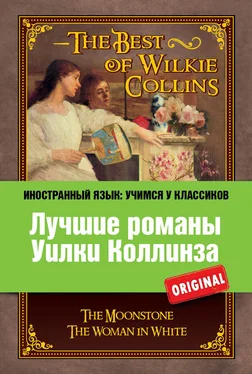I reached the inn without meeting Sir Percival, and without noticing anything more, and was glad to find that the landlady had received Fanny with all possible kindness. The girl had a little parlour to sit in, away from the noise of the taproom, and a clean bedchamber at the top of the house. She began crying again at the sight of me, and said, poor soul, truly enough, that it was dreadful to feel herself turned out into the world as if she had committed some unpardonable fault, when no blame could be laid at her door by anybody – not even by her master, who had sent her away.
“Try to make the best of it, Fanny,” I said. “Your mistress and I will stand your friends, and will take care that your character shall not suffer. Now, listen to me. I have very little time to spare, and I am going to put a great trust in your hands. I wish you to take care of these two letters. The one with the stamp on it you are to put into the post when you reach London to-morrow. The other, directed to Mr. Fairlie, you are to deliver to him yourself as soon as you get home. Keep both the letters about you and give them up to no one. They are of the last importance to your mistress’s interests.”
Fanny put the letters into the bosom of her dress. “There they shall stop, miss,” she said, “till I have done what you tell me.”
“Mind you are at the station in good time to-morrow morning,” I continued. “And when you see the housekeeper at Limmeridge give her my compliments, and say that you are in my service until Lady Glyde is able to take you back. We may meet again sooner than you think. So keep a good heart, and don’t miss the seven o’clock train.”
“Thank you, miss – thank you kindly. It gives one courage to hear your voice again. Please to offer my duty to my lady, and say I left all the things as tidy as I could in the time. Oh, dear! dear! who will dress her for dinner to-day? It really breaks my heart, miss, to think of it.”
When I got back to the house I had only a quarter of an hour to spare to put myself in order for dinner, and to say two words to Laura before I went downstairs.
“The letters are in Fanny’s hands,” I whispered to her at the door. “Do you mean to join us at dinner?”
“Oh, no, no – not for the world.”
“Has anything happened? Has any one disturbed you?”
“Yes – just now – Sir Percival – ”
“Did he come in?”
“No, he frightened me by a thump on the door outside. I said, ‘Who’s there?’ ‘You know,’ he answered. ‘Will you alter your mind, and tell me the rest? You shall! Sooner or later I’ll wring it out of you. You know where Anne Catherick is at this moment.’ ‘Indeed, indeed,’ I said, ‘I don’t.’ ‘You do!’ he called back. ‘I’ll crush your obstinacy – mind that! – I’ll wring it out of you!’ He went away with those words – went away, Marian, hardly five minutes ago.”
He had not found Anne! We were safe for that night – he had not found her yet.
“You are going downstairs, Marian? Come up again in the evening.”
“Yes, yes. Don’t be uneasy if I am a little late – I must be careful not to give offence by leaving them too soon.”
The dinner-bell rang and I hastened away.
Sir Percival took Madame Fosco into the dining-room, and the Count gave me his arm. He was hot and flushed, and was not dressed with his customary care and completeness. Had he, too, been out before dinner, and been late in getting back? or was he only suffering from the heat a little more severely than usual?
However this might be, he was unquestionably troubled by some secret annoyance or anxiety, which, with all his powers of deception, he was not able entirely to conceal. Through the whole of dinner he was almost as silent as Sir Percival himself, and he, every now and then, looked at his wife with an expression of furtive uneasiness which was quite new in my experience of him. The one social obligation which he seemed to be self-possessed enough to perform as carefully as ever was the obligation of being persistently civil and attentive to me. What vile object he has in view I cannot still discover, but be the design what it may, invariable politeness towards myself, invariable humility towards Laura, and invariable suppression (at any cost) of Sir Percival’s clumsy violence, have been the means he has resolutely and impenetrably used to get to his end ever since he set foot in this house. I suspected it when he first interfered in our favour, on the day when the deed was produced in the library, and I feel certain of it now.
When Madame Fosco and I rose to leave the table, the Count rose also to accompany us back to the drawing-room.
“What are you going away for?” asked Sir Percival – “I mean YOU, Fosco.”
“I am going away because I have had dinner enough, and wine enough,” answered the Count. “Be so kind, Percival, as to make allowances for my foreign habit of going out with the ladies, as well as coming in with them.”
“Nonsense! Another glass of claret won’t hurt you. Sit down again like an Englishman. I want half an hour’s quiet talk with you over our wine.”
“A quiet talk, Percival, with all my heart, but not now, and not over the wine. Later in the evening, if you please – later in the evening.”
“Civil!” said Sir Percival savagely. “Civil behaviour, upon my soul, to a man in his own house!”
I had more than once seen him look at the Count uneasily during dinner-time, and had observed that the Count carefully abstained from looking at him in return. This circumstance, coupled with the host’s anxiety for a little quiet talk over the wine, and the guest’s obstinate resolution not to sit down again at the table, revived in my memory the request which Sir Percival had vainly addressed to his friend earlier in the day to come out of the library and speak to him. The Count had deferred granting that private interview, when it was first asked for in the afternoon, and had again deferred granting it, when it was a second time asked for at the dinner-table. Whatever the coming subject of discussion between them might be, it was clearly an important subject in Sir Percival’s estimation – and perhaps (judging from his evident reluctance to approach it) a dangerous subject as well, in the estimation of the Count.
These considerations occurred to me while we were passing from the dining-room to the drawing-room. Sir Percival’s angry commentary on his friend’s desertion of him had not produced the slightest effect. The Count obstinately accompanied us to the tea-table – waited a minute or two in the room – went out into the hall – and returned with the post-bag in his hands. It was then eight o’clock – the hour at which the letters were always despatched from Blackwater Park.
“Have you any letter for the post, Miss Halcombe?” he asked, approaching me with the bag.
I saw Madame Fosco, who was making the tea, pause, with the sugar-tongs in her hand, to listen for my answer.
“No, Count, thank you. No letters to-day.”
He gave the bag to the servant, who was then in the room; sat down at the piano, and played the air of the lively Neapolitan street-song, “La mia Carolina,” twice over. His wife, who was usually the most deliberate of women in all her movements, made the tea as quickly as I could have made it myself – finished her own cup in two minutes, and quietly glided out of the room.
I rose to follow her example – partly because I suspected her of attempting some treachery upstairs with Laura, partly because I was resolved not to remain alone in the same room with her husband.
Before I could get to the door the Count stopped me, by a request for a cup of tea. I gave him the cup of tea, and tried a second time to get away. He stopped me again – this time by going back to the piano, and suddenly appealing to me on a musical question in which he declared that the honour of his country was concerned.
Читать дальше
Конец ознакомительного отрывка
Купить книгу












